Residential Support
This program provides government subsidies for a portion of the installation costs when PV systems are installed in single-family homes or multi-family housing. PV modules are installed on roofs, windows, or rooftops, and the electricity generated is used directly.
For this project, we are applying the same "high-efficiency system from SDN Co., Ltd." that is used in commercial PV plants.
Eligible Recipients
Individual Unit Support
| Categories | Eligibility |
|---|---|
| Single-family Homes | Owners or prospective owners of existing or newly constructed homes |
| Multi-family Housing | Multi-family Housing
(Existing Multi-family Housing) Owners of multi-family housing or representatives of tenants * Required : Handwritten consent from all tenants (heads of households) or a resolution from the tenants' representative meeting (Newly Constructed Multi-family Housing) Developers, construction representatives, or tenant representatives of multi-family housing under construction. * Required: Must be new multi-family housing that can be completed by the installation deadline |
| Online application available on the Residential Support Program website : https://nr.energy.or.kr/home. |
1. If the ownership of the property is held jointly, the application must be submitted in the name of the owner with the largest share. The installed equipment will be recognized as the property of the applicant. Note: Consent from all joint owners must be submitted.
2. Support is provided only for homes that can complete the installation within the specified period from the application date. Failure to complete installation within the deadline will result in cancellation of the project.
3. Installation of electrical equipment (such as PV systems) is only allowed if the electricity contract with KEPCO is classified for residential use.
4. Buildings owned by the national or local governments are not eligible for support.
5. Only equipment for personal use is eligible for support.
6. PV subsidies cannot be combined with the PV Rental Program.
7. Homes that are part of a local government’s mandatory renewable energy program are not eligible for support, except for additional installations that meet the required ratio.
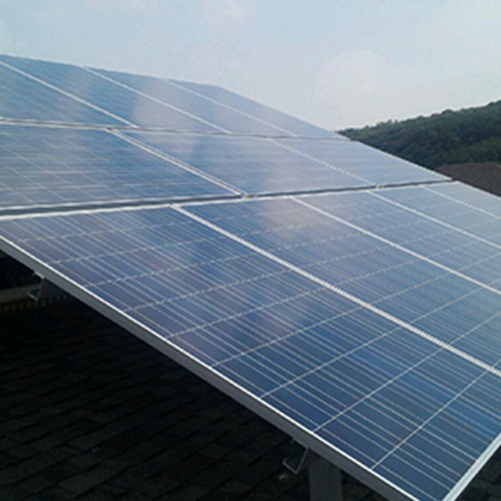
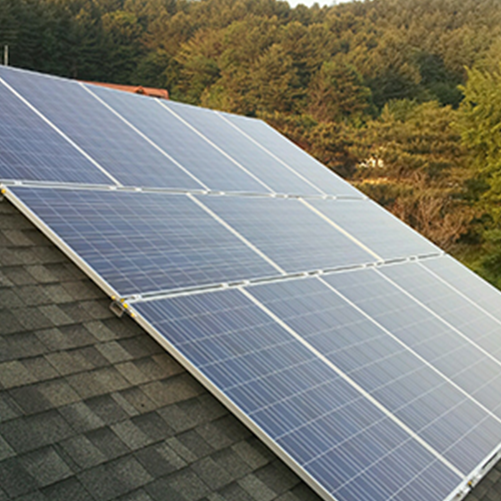
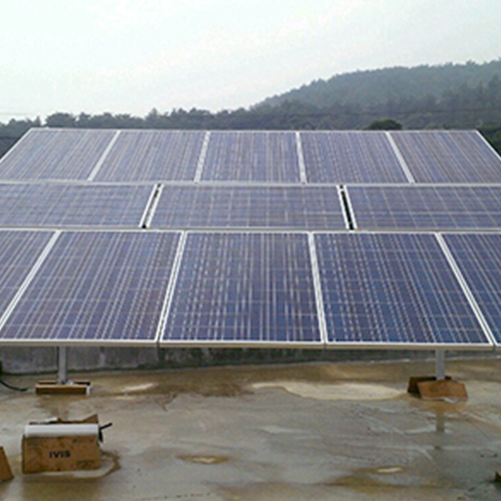
Objectives
By promoting the installation of new and renewable energy systems in single-family and multi-family (including public) housing, the program aims to reduce residential energy consumption and expand the use of new and renewable energy systems. This contributes to greenhouse gas reduction and creates a stable investment environment and market formation for the new and renewable energy industry, thereby fostering the growth of the renewable energy market.
Subsidy Support Criteria
Subsidy support criteria are based on the type and capacity of the energy source (as of 2023).
(Unit : KRW ‘000, VAT Included)
| Energy Source | Support Type | Subsidy Rate | Island Area Subsidy Rate | ||||
|---|---|---|---|---|---|---|---|
| Photovoltaics (Fixed) |
Module Type | Standard Module | Low-Carbon Module | Standard Module | Low-Carbon Module | ||
| Single-family Housing | Below 2.0 kW | 1,181/kW | 1,259/kW | 1,358/kW | 1,448/kW | ||
| Above 2.0 kW to 3.0 kW | 936/kW | 1,014/kW | 1,076/kW | 1,166/kW | |||
| Multi-family Housing | Up to 30 kW/building | 882/kW | 919/kW | 1,015/kW | 1,057/kW | ||
| Solar Thermal | Flat/Vacuum Type | Up to 7.0㎡ | Above 10.0 MJ/m²·day | 753/㎡ | 866/㎡ | ||
| Above 7.5 MJ/m²·day to 10.0 MJ/m²·day | 690/㎡ | 794/㎡ | |||||
| Up to 7.5 MJ/m²·day | 628/㎡ | 722/㎡ | |||||
| Above 7.0㎡ to 14.0㎡ | Above 10.0 MJ/m²·day | 755/㎡ | 868/㎡ | ||||
| Above 7.5 MJ/m²·day to 10.0 MJ/m²·day | 692/㎡ | 796/㎡ | |||||
| Up to 7.5 MJ/m²·day | 629/㎡ | 723/㎡ | |||||
| Above 14.0㎡ to 20㎡ | Above 10.0 MJ/m²·day | 653/㎡ | 751/㎡ | ||||
| Above 7.5 MJ/m²·day to 10.0 MJ/m²·day | 598/㎡ | 688/㎡ | |||||
| Up to 7.5 MJ/m²·day | 544/㎡ | 626/㎡ | |||||
| Natural Circulation Water Heater | 6.0㎡ grade | 4,057 per unit | 4,665 per unit | ||||
| Geothermal | Vertical Sealed Type | Up to 10.5 kW | 825/kW | 948/kW | |||
| Above 10.5 kW to 17.5 kW | 707/kW | 812/kW | |||||
| Fuel Cell | Up to 1 kW | 13,836/kW | 15,911/kW | ||||
* Support Category: Installation Target, Equipment Category, Monthly Average Electricity Usage, Installed Capacity, Thermal Efficiency (Performance)
* "Low-carbon modules" refer to products that have been verified to have a carbon emission of 670 kg·CO2-eq/kW or less according to the guidelines for supporting the operation of low-carbon PV module products (Ministry of Industry Notification), and the support price applies when applied to the entire household.
Building Support
SDN Corporation offers partial government subsidies for the installation of PV generation systems up to 50 kW in all general buildings (excluding buildings/facilities owned or managed by housing/national/local government organizations and buildings subject to installation obligations).
We can provide design and construction considering various environmental conditions such as buildings and parking lots.

Subsidy Support Criteria
Individuals wishing to install new or renewable energy facilities for self-use in general buildings or facilities, who are owners (or representatives in the case of joint ownership) or prospective owners listed on the real estate registration of the planned installation site.
* Excludes housing support projects (single-family homes, multi-family housing Bogeumjari houses), regional support projects, and buildings subject to installation obligations
| Categories | Criteria |
|---|---|
| Building Support Program | All buildings and facilities excluding those specified in Article 21 of the Ministry of Trade, Industry and Energy's notification 'Regulations on Support for New and Renewable Energy Facilities' and those specified in Article 26 owned or managed by local governments |
| Pilot Program | If one intends to install new and renewable energy facilities on all houses, buildings, and associated facilities for a certain period of time as a pilot project to apply technology development results or to apply new technologies after demonstrating them, please note that buildings and facilities owned or managed by the state are excluded from the support target, as defined in Article 2 (Definitions) of the Subsidy Management Act. |
1. Support is provided only for facilities that have been installed after the announcement of the project. If it is found that the project was applied for after the commencement of facility installation, the project will be canceled.
2. Facilities installed on buildings owned by selected participating companies are excluded from support.
3. Applicants and participating companies must strictly adhere to relevant laws, regulations, center guidelines, and project support announcements. Failure to meet the criteria may result in the suspension of subsidy payments, recovery, or cancellation of the project.
4. During the project, all details in the submitted documents must be accurately filled out. Errors, omissions, or discrepancies may lead to project cancellation.
5. Government subsidies are directly paid to participating companies after obtaining consent for government subsidy payments from the applicant, unless there are special reasons. However, the determination of such special reasons shall be at the discretion of the head of the center
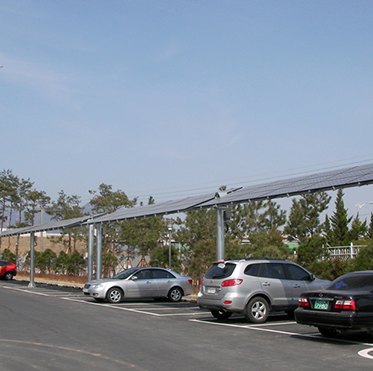
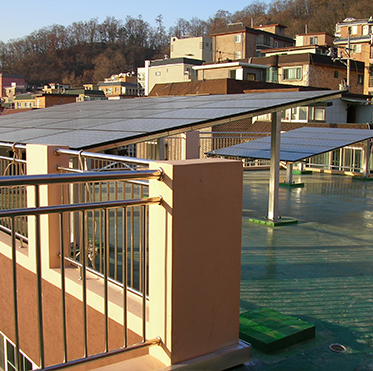
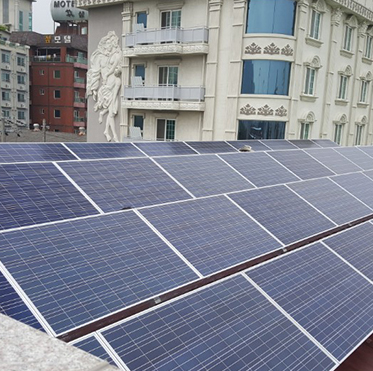
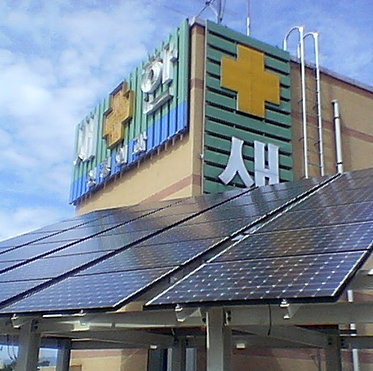
Objective
To promote the commercialization of newly developed renewable energy technologies by providing partial government subsidies and support for installation costs of new and renewable energy facilities. To promote the commercialization of newly developed technologies and stimulate market creation and expansion of renewable energy through widespread dissemination of commercialized technologies.
Building Support Project
A large-scale dissemination project of commercialized facilities targeting self-use.
Pilot Project
A pilot project for the commercialization of developed technologies (support within 80% for self-use facilities).
| Categories | Support Range (per Project) | Budget (KRW m) | Subsidy Rate (KRW ‘000 VAT included) | Note | ||||
|---|---|---|---|---|---|---|---|---|
| Building Support Project | Photovoltaic (Fixed) |
General | 200kW or less | 28,329 | Standard Module | 972/kW | - | |
| Low-Carbon Module | 1,009/kW | |||||||
| Livestock Facilities | Standard Module | 1,120/kW | ||||||
| Low-Carbon Module | 1,167/kW | |||||||
| Building Integrated | - | 9,177 | Further Review | Up to 70% Priority Support (Roof Type 50%, Wall Type 70%) |
||||
| Photovoltaic (Flat Plate / Vacuum Tube / Natural Circulation) |
1,500㎡ or less | Above 10.0MJ/㎡·day | 3,872 | 716/㎡ | Excludes Off-peak Power Equipment | |||
| Above 7.5MJ/㎡·day ~ to 10.0MJ/㎡·day |
651/㎡ | |||||||
| Up to 7.5MJ/㎡·day | 585/㎡ | |||||||
| Water Heater 6㎡x per unit | 3,453 per unit | |||||||
| Heating and cooling | 982/㎡ | |||||||
| Geothermal (Vertical Sealed) | Up to 1,000㎾ | 2,723 | 697/kW | - | ||||
| Fuel Cell | - | 7,860 | 11,992/kW | - | ||||
| Other | - | 379 | Further Review | Photovoltaics (Tracking) Concentrated PV, Wind Power, Water thermal energy etc. | ||||
| Subtotal | - | 52,340 | - | - | ||||
| Pilot Project | - | 8,834 | Further Review | - | ||||
| Grand Total | - | 61,174 | - | |||||
 Energy Storage System (ESS)
Energy Storage System (ESS)
ESS refers to a storage device (battery) that stores surplus electricity and supplies it when power is needed, aiming to promote efficiency in power usage
ESS Charging and Discharging system
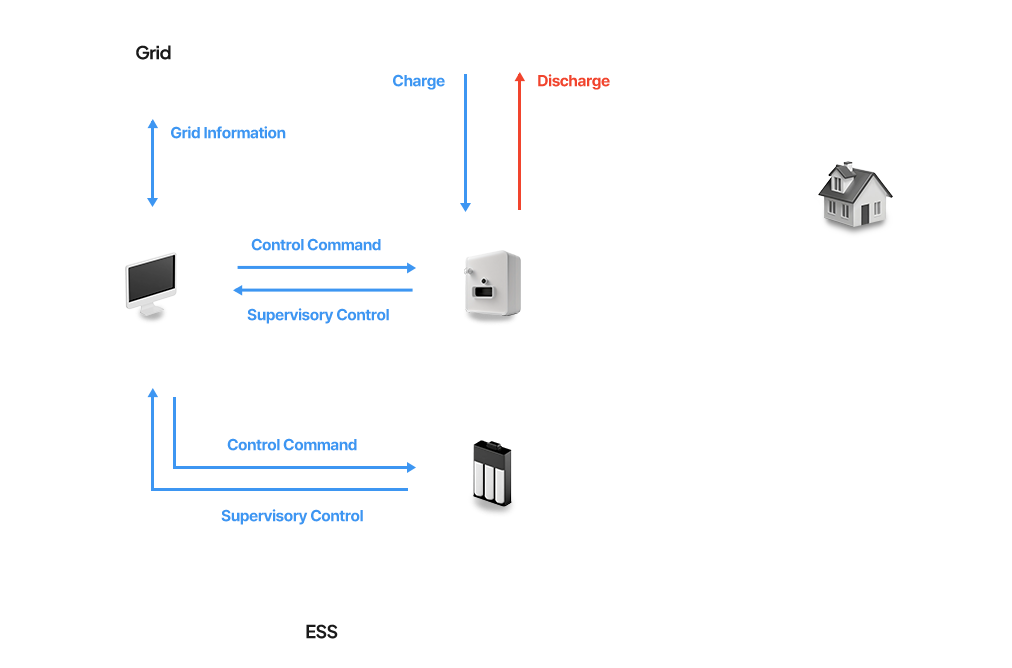
Peak Time Shaving ESS
A 1MWh ESS has been installed for peak cut and maximum load management at the Gwangju Factory and is currently being monitored in real-time. Alongside performance evaluation of the facility, we will continue to evolve into a specialized ESS company in the field of renewable energy by leveraging "long-term cumulative generation data" from PV plants constructed nationwide since 2004.
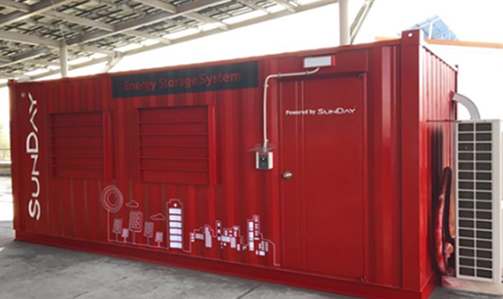
SDN Co., Ltd Gwangju Factory, 1MWh ESSS
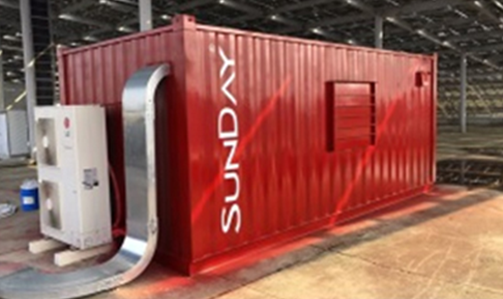
SDN Co., Ltd Gwangju Factory, 1MWh ESS
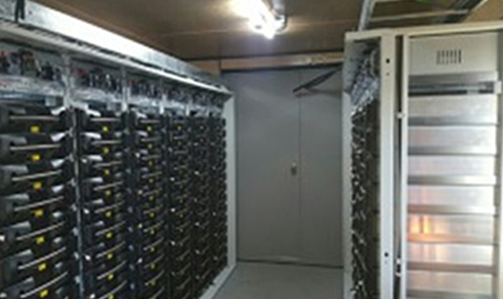
SDN Co., Ltd Gwangju Factory, 1MWh ESS
The Importance of Energy Storage Systems (ESS)
Improvement of Power Quality and Reduction of CO2 Emissions + Avoidance of Investments in Power Plants and Power Grid
| Large-scale Storage (thermal power generation, renewable energy, etc.) | Transmission and Distribution Efficiency Improvement Storage (substation installation) | Customer-side Storage (residential, industrial, etc.) |
|---|---|---|
| Increase in power production Renewable energy sources Output stabilization |
Frequency management, voltage management, Reserve power services, Self-starting auxiliary services |
Peak Shifting of power loads and Peak Cut for reducing maximum loads |
Components of Energy Storage Systems (ESS)
BMS(Battery Management System)
Capacity protection, lifespan prediction, charging and discharging control for battery cells
PCS(Power Conversion System)
Conversion of AC to DC during battery charging and DC to AC during discharging for output control
EMS(Energy Management System)
Control of overall ESS functions including charging and discharging time, speed, and amount

